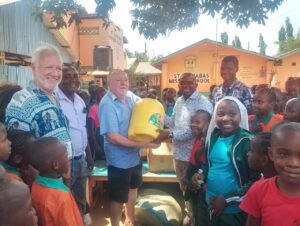Reclaiming Our Waters: The Urgent Need for Kenyan Salvage Expertise

MT Mwokozi II on her mayden voyage from ship yard in Turkey to her home port of Mombasa (Photo/ Courtesy)
By Andrew Mwangura
Email, thecoastnewspaper@gmail.com
Kenya stands at a critical maritime crossroads. With the acquisition of the impressive _MT_ _Mwokozi_ _II_ (“Saviour II”), the Kenya Ports Authority has taken a significant step toward establishing itself as a regional maritime power.
Yet this sophisticated vessel — capable of ship handling, coastal towing, and vital salvage operations—represents only part of what is needed for Kenya to fully secure its territorial waters and position itself as a maritime leader in East Africa.
Human expertise
Despite possessing advanced equipment, Kenya faces a severe shortage of trained salvage professionals, with only three highly trained salvage masters—all over 60 years of age.
This represents an imminent crisis of expertise that threatens to undermine our maritime sovereignty and economic potential.
The establishment of the IMO’s Regional Maritime Search and Rescue Coordination Centre within the Port of Mombasa highlights the strategic importance of our position along the Western Indian Ocean Seaboard.
With vessel groundings becoming increasingly common in our territorial waters, the need for robust salvage capabilities has never been more apparent.
Yet the stark reality is that no country in the eastern and northern seaports of East Africa currently possesses the capacity to mount proper sea salvage and search and rescue operations.
Kenya has the opportunity—and responsibility—to fill this critical regional void.
Beyond Equipment
While the MT Mwokozi II represents cutting-edge maritime technology—with its impressive 126-tonne bollard pull capacity, Caterpillar C280-12 diesel engines, and comprehensive firefighting systems—the vessel’s potential remains largely unfulfilled without properly trained personnel.
A salvage tug without salvage masters is like a sophisticated hospital without doctors.
The painful truth is that this multi-million-dollar investment cannot perform the salvage operations it was designed for without qualified crew members who understand the complex, dangerous work of maritime salvage.
This represents not just a waste of resources but a failure to capitalize on a significant economic opportunity.
Strategic Necessity
The need for robust salvage capabilities extends far beyond the Port of Mombasa. At the busy Likoni and Mtongwe Ferry Crossings, where thousands of Kenyans commute daily, the ability to mount rapid salvage operations could prove lifesaving in the event of a marine accident.
The tragic incidents we’ve witnessed at these crossings underscore the urgency of having specialized salvage teams ready to respond within minutes.
Similarly, as the new Port of Lamu develops into a critical regional hub, its operations will require sophisticated salvage support.
The vast western Indian Ocean region—from our territorial waters to the busy shipping lanes of the Mozambique Channel and as far north as Ras Hafun (Cape Hafun) off Somali waters—represents both a responsibility and an opportunity for Kenyan salvage operations.
Perhaps less visible, but equally critical is the protection of our digital infrastructure. The undersea internet cables landing in Kenya represent vital arteries for our economy and communications.

Damage to these cables can cause massive disruption, and specialized underwater salvage and repair capabilities are essential for maintaining this critical infrastructure.
Life-Saving Medical Infrastructure
A crucial element missing from our salvage infrastructure is readily accessible emergency medical support for divers.
Currently, the only decompression chamber available for treating diving emergencies is located at the Kenya Naval base, approximately 10 kilometers south of Mombasa mainland.
This distance could prove fatal in cases of decompression sickness or other diving emergencies, where minutes can make the difference between recovery and permanent disability or death.
The establishment of a decompression chamber at Coast General Hospital in Mombasa is not merely a convenience but a necessity for a serious salvage operation.
This facility would ensure that professional divers engaged in emergency salvage operations have immediate access to life-saving treatment for decompression illness.
For any nation serious about developing professional diving capabilities, accessible hyperbaric medical facilities are as essential as the diving equipment itself.
Comprehensive Approach
Kenya must take immediate action to address these critical shortages through a comprehensive strategy.
First, revitalize the KPA diving department. The Port of Mombasa’s diving department must be urgently revived and expanded to support salvage operations.
This department should serve as the foundation for building local expertise in underwater salvage techniques.
Second, establish a specialized diving school. Kenya needs a dedicated diving school in Mombasa that can provide specialized training for salvage divers, underwater exploration specialists, scientific researchers, underwater cable installation experts, and underwater welding professionals.
This school would not only address our immediate needs but position Kenya as a regional center of excellence for maritime training.
Third is knowledge transfer program. With only three aging salvage masters remaining, Kenya must implement an aggressive knowledge transfer initiative, partnering these experts with younger professionals to ensure their invaluable experience is not lost to retirement.
Fourth is medical infrastructure through installing a modern decompression chamber at Coast General Hospital to provide immediate treatment for diving emergencies, ensuring the safety of salvage divers and supporting the professional diving industry.
Economic and Security Imperatives
Beyond the immediate operational concerns, developing robust salvage capabilities represents a significant economic opportunity.
As acknowledged by KPA management, salvage operations can create an entirely new revenue stream for the ports authority while enhancing Kenya’s standing as a leading port along the Western Indian Ocean Seaboard.
Moreover, the ability to conduct effective salvage operations in our territorial waters is fundamental to national security, environmental protection, and sovereignty.
Without this capability, Kenya remains dependent on foreign expertise for incidents within our own waters—a situation that is neither sustainable nor acceptable for a nation with our maritime ambitions.
Time for Action
The procurement of MT Mwokozi II demonstrates Kenya’s commitment to maritime excellence.
Now we must match this commitment to equipment with an equal investment in human capital and supporting infrastructure.
The establishment of a diving school in Mombasa and critical medical facilities would serve multiple national interests—from commercial salvage operations to scientific research, infrastructure maintenance, and national security.

It would create skilled employment opportunities for Kenyan youth while positioning our nation as a regional maritime leader.
As we look to the future of Kenya’s maritime sector, we must recognize that our greatest assets are not just the vessels we operate, but the expertise we develop and the infrastructure we build to support them.
The time has come to invest in Kenyan salvage professionals who can safeguard our waters, protect our environment, and unlock new economic opportunities for generations to come.
The MT Mwokozi II awaits its proper crew. Let us ensure it does not wait in vain.
The writer is a Maritime Affairs Analyst.






